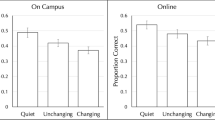Summary
A modified Brown-Peterson paradigm was employed to determine the extent to which proactive interference effects of a sensory nature would influence the occurrence of sensory encoding specificity effects in episodic memory. Subjects presented with an auditory or a visual study list of five to-be-remembered (TBR) words engaged in either an auditory or a visual arithmetic distractor task for 30 s, and then received the first word in the study list as an auditory or visual intralist retrieval cue or received no cue. Presentation of the intralist retrieval cue in the modality of the study list enhanced the effectiveness of the retrieval cue, whereas presentation of the retrieval cue in the modality of the distractor task decreased the effectiveness of the retrieval cue. Sensory encoding specificity effects were largest when the distractor task occurred in the modality opposite to the modality in which both the study list and the retrieval cue were presented.
Similar content being viewed by others
References
Clark HH (1973) The language-as-fixed-effect fallacy: A critique of language statistics in psychological research. J Verb Learn Verb Behav 12:335–359
Cohen J (1976) Discussion of Wike and Church's comments: Random means random. J Verb Learn Verb Behav 15:261–262
Coleman EB (1979) Generalization effects vs random effects: Is σ 2TL a source of Type 1 or Type 2 error? J Verb Learn Verb Behav 18:243–256
Falkenberg PR (1972) Recall improves in short-term memory the more recall context resembles learning context. J Exp Psychol 95:39–47
Forster KI, Dickinson RG (1976) More on the language-as-fixed-effect fallacy: Monte Carlo estimates of error rates for F1, F2, F', and min F'. J Verb Learn Verb Behav 15:135–142
Hopkins RH, Edwards RE, Cook CL (1973) Presentation modality, distractor modality, and proactive interference in short-term memory. J Exp Psychol 98:362–367
Hopkins RH, Edwards RE, Gavelek JR (1971) Presentation modality as an encoding variable in short-term memory. J Exp Psychol 90:319–325
Keppel G (1976) Discussion of Wike and Church's comments: Words as random variables. J Verb Learn Verb Behav 15:263–265
Keppel G (1973) Design and analysis: A researcher's handbook. Prentice-Hall, Englewood Cliffs, New Jersey
Shiffrin RM (1973) Information persistence in short-term memory. J Exp Psychol 100:39–49
Smith JEK (1976) Discussion of Wike and Church's comments: The assuming-will-make-it-so fallacy. J Verb Learn Verb Behav 15:263
Thorndike EL, Lorge I (1944) The teacher's word book of 30,000 words. Columbia University, Teachers College, Bureau of Publication, New York
Tulving E (1972) Episodic and semantic memory. In: Tulving E, Donaldson W (eds) Organization in memory. Academic Press, New York
Tulving E, Thomson DM (1973) Encoding specificity and retrieval processes in episodic memory. Psychol Rev 80:352–373
Watkins MJ, Tulving E (1975) Episodic memory: when recognition fails. J Exp Psychol: General 104:5–29
Wickens DD (1970) Encoding categories of words: an empirical approach to meaning. Psych Rev 77:1–15
Wickens DD (1972) Characteristics of word encoding. In: Melton AW, Martin E (eds) Coding processes in human memory. Wiley, New York
Wike EL, Church JD (1976) Comments on Clark's ‘The language-as-fixed-effect fallacy’. J Verb Learn Verb Behav 15:249–255
Author information
Authors and Affiliations
Rights and permissions
About this article
Cite this article
Krane, R.V., Hatton, L.J. Encoding specificity and modality effects in episodic memory. Psychol. Res 42, 353–362 (1980). https://doi.org/10.1007/BF00308731
Received:
Issue Date:
DOI: https://doi.org/10.1007/BF00308731




